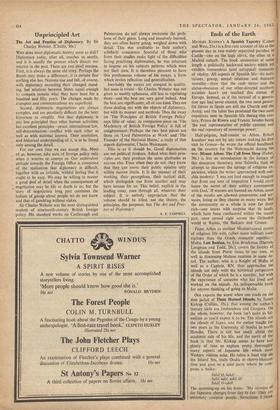Unprincipled Art
The Art and Practice of Diplomacy. By Sir Charles Webster. (Chatto, 30s.) WHY does most diplomatic history seem so dull? .Diplomacy today, after all, touches us nearly, and it is usually the present which directs our interest in the past. There are two Chief reasons. First, it is always the same old story. Perhaps the Bomb may make a difference; it is certain that nothing else has. Nations rise and fall, of course, with diplomacy recording their changed stand- ing, but relations between States equal enough to compete remain what they have been for a hundred and fifty years. The changes made by transport and communications are superficial.
Second, diplomatic negotiations are always complex, and are peculiarly difficult for the later historians to simplify. Not that diplomacy is any less principled than other human activities; but excellent principles—peace, international law, self-determination--conflict with each other as well as with national interest. Their resolution, and historical understanding of it, is to be found only among the detail.
For our own time we can accept this. Most of us, however, take note of foreign policy only when it worries or annoys us. Our ambivalent attitude towards the Foreign Office is composed of the realisation that diplomacy is difficult, together with an irritable, wishful feeling that it ought to be easy. We may be willing to master a good deal of detail when the consequences of negotiation may be life or death to us; but the story of negotiation long past combines the tedium of gossip about people we do not know and that of gambling without stakes.
Sir Charles Webster was the most distinguished student of nineteenth-century British foreign policy. His standard works on Castlereagh and
Palmerston do not always overcome the prob- lems of their genre. Long and massively learned, they are often heavy going, weighed down with detail. This was creditable to their author's scholarly conscience. Scornful of those who from their studies make light of the difficulties facing practising diplomatists, he was reluctant to impose on his subjects patterns which were not their own. It is therefore pleasant to have this posthumous volume of his essays, a form which invites reflection and generalisation.
Inevitably the essays are unequal in quality, but none is trivial—Sir Charles Webster was not given to weekly ephemera, still less to reprinting them—and the best are very good indeed. And the best are, significantly, all of one kind. They are those dealing not with the objects of diplomacy, but with its manner and methods. Thus the essay on The Principles of British Foreign Policy' says little of value; its companion-piece on 'The Machinery of British Foreign Policy' is full of enlightenment. Perhaps the two best pieces are those on 'Lord Palmerston at Work' and 'The Founder of the National Home,' a study of that superb diplomatist, Chaim Weizmann.
This as it should be. Good diplomatists are not political thinkers. Asked what their prin- ciples are, they produce the same platitudes as anyone else. Even when they do not, they know that they can move their public opinion only within narrow limits. It is the manner of their working, their perceptions, their tactical skill, which distinguish one from another and may have lessons for us. This belief, explicit in the leading essay, runs through all, whatever their subject. It is entirely appropriate that the volume should be titled, not the theory, the principles, the purposes, but The Art and Prac- tice of Diplomacy.
A. E. CAMPBELL






































 Previous page
Previous page